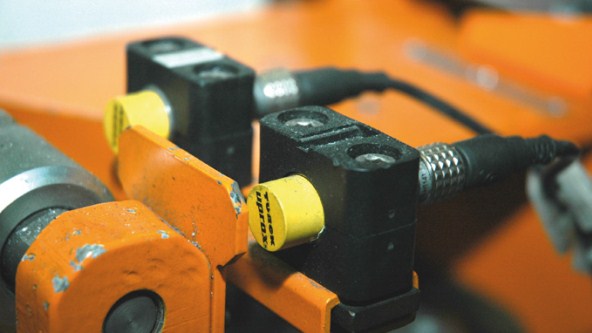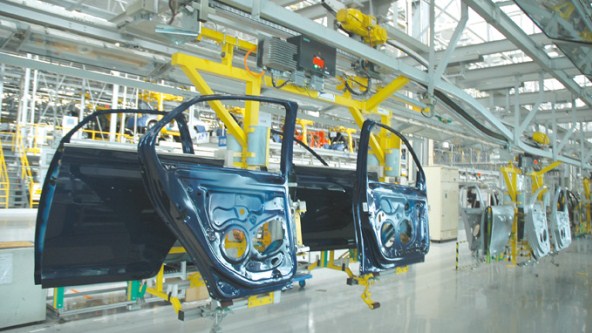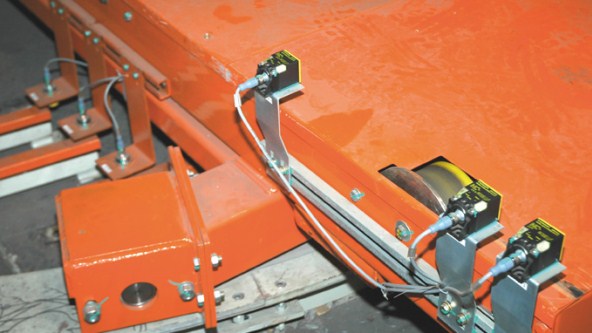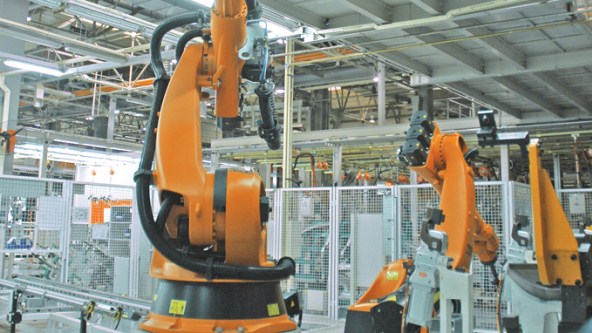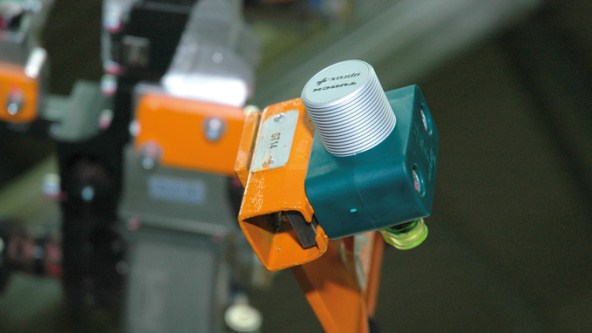Welding and Assembly Sensors
FAW Volkswagen relies on Uprox+ sensors for precise, reliable welding and assembly processes at its automobile production lines in China
The demands placed on the automated production lines of vehicle manufacturers are always on the rise. Purchasers want exclusive, high quality, and individually tailored solutions. New materials, production technologies, and levels of automation require automation solutions to be constantly updated. For welding and assembly processes in its Chinese production plants, FAW-VW found a versatile and reliable solution in the Uprox+ sensors from Turck.
In order to ensure the efficient production of high quality automobiles like VW’s new Sagitar or the Magotan vehicle lines, FAW-VW Automobile Co., Ltd. – a joint venture between the Chinese government-owned First Automotive Works, Germany’s Volkswagen AG, Audi AG and Volkswagen Automobile (China) Investment Co., Ltd. – relies on sensor technology from Turck.
High demands placed on sensors
During the course of the rapid development in the Chinese automobile industry, customer demands have risen with regard to quality, functionality and efficiency. This has led FAW-VW – like all automobile manufacturers in the end – to use new materials and technologies in order to facilitate the flexible production of different vehicle types and models at one location. Equally high were the automobile manufacturer’s requirements with regard to the sensor technology used. In order to be able to detect workpiece positions in the various stages of automated production, such as stamping, painting, welding and final assembly, the sensors have to be robust, versatile, and cost-efficient – requirements that the Factor 1 sensors from the uprox+ product line fully meet.
Factor 1 on all metals
Thanks to multi-spule technology, the sensors designed to meet the IP68 protection class detect all metals without a reduction factor – regardless of whether it is iron, stainless steel, copper, aluminum or brass. Not only that, in comparison to conventional ferrite core sensors, uprox+ made it possible for FAW-VW to detect all metals used in the production lines with considerably higher switching distances up to 50 mm (FAW-VW uses the Ni50U-CK40 series) – thus offering high degrees of freedom for installation and area of application. A further advantage of the Factor 1 sensors that are sold by Turck (Tianjin) Sensor Co., Ltd. (TTS) in China is the fact that with the few sensor types that are suitable for many applications within the production line, the automobile manufacturer was able to set up simple and cost-efficient warehousing.
One of the hardest areas of application in the FAW-VW plants is welding assembly. In the overall production line, the individual parts of the various sedan models run through up to 5,000 spot welding steps. For monitoring the automated motion sequences, FAW-VW relies on the sensors from Turck’s MT series. Mounted on the robot arms, the special sensors coated with teflon continuously check the position of the robotics in relation to the workpieces. In welding assembly, not only high switching distances are required in order to be able to detect the position of the workpieces early on and, if necessary, correct them, but also excellent shielding against external environmental conditions. Because uprox+ sensors do not contain ferrite core, they are equally insensitive to strong magnetic fields, like those that develop during the welding process, as they are to flying sparks or mechanical wear.
- Automotive
- Modular Flexibility and Safety in Filter Production
- Cable with Integrated Current Monitoring Prevents Unwanted Shutdown of Conveying System
- Inductive Couplers Ensure Precise Material Feed
- Assembly Management with a Direct MES Connection
- Body Detection in Automobile Production
- Reliable Skid Detection in Automotive Production
- Error-free JIS Order Picking for Bumpers
- Laser Sensor Detects Shiny Sheet Metal Cylinders in Battery Production
- RFID Bus Mode Ensures Quality of Lithium-Ion Batteries
- Level Measurement in Dip Coating Line
- Level Control in Central Lubrication System
- Quality Assurance on the Gluing Robot
- Tilt angle sensor accelerates platform alignment
- Motor Control with Condition Monitoring
- IP67 Hybrid Module Processes Safety Signals
- Decentralized monitoring of cooling stations
- Monitoring the cooling circuit on welding clamps
- Flow monitoring in drum washers
- Sheet Metal Thickness Measurement
- Condition Monitoring of Motors
- Cloud-based level monitoring
- Press Shop – Tool Identification
- Body Shop – Welding Nut Detection
- Paint Shop – Skid Identification
- Final Assembly – Robot Assembly
- Powertrain – Contactless Verification
- Area Guarding for Robotic Cells
- Item-level Detection with UHF RFID
- Supply of cooling lubricant in machine tools
- Press Shop: Controlling hydraulic pressure
- Measuring process pressure on scissor lifts
- Inspection of Tips on a Welder
- Manual Feeding in Weld Cell
- Detecting Black Parts on Black Door Panel
- Moonroof Clear Glass Detection
- Long-Range Inspection in Automotive Assembly
- Rubber Washer Detection on Engine Block
- Engine Block Part-In-Place Detection
- Electric Vehicle Detection in Charging Station
- Vehicle Detection in a Self-Serve Car Wash
- SUCCESS STORIES
- RFID Solution for Data Acquisition in Stator Production
- Modular Plant for Flexible and Efficient Production
- Laser Sensor Detects Black Bumpers in Assembly Cell
- Decentralized Safety Technology for Modular Production
- Modular Conveyor System
- RFID and I/O Modules for Safe Tool Changes
- RFID Guides AGV in Suspension Production
- IO-Link Wired Silencer Production
- Workpiece Carrier Identification in Rear Vent Production
- Weld Nut Sensing
- RFID Traceability
- RFID in Engine Production
- Bumper Production with Identification
- Solutions for Paint Shops
- Welding and Assembly Sensors
- Angle Sensors for Assembly Systems
- Tool Identification
- Pick-to-Light for Bumper Assembly
- RFID Identification of Injector Nozzles
- RFID in the Body Shop
- IO-Link Eases Differential Gear Production
- Ply Orientation Inspection
- Chemical
- excom I/O System Enables Safe Hydrogen Liquefaction
- Decentralized Automation in Ex Areas
- RFID Control of Tube Connections in the Ex Area
- Ethernet Signal Connection in the I&C Room
- Ethernet-based Automation of Modular Skids
- Ex Isolation in Modular Process Plants
- Detection of Pigs
- Remote Tank Level Monitoring with DX70
- Remote Signal I/O
- Easy Connection of Field Devices
- Signal Processing with System I/O in the Control Cabinet
- Signal Separation with Interface Technology in the Control Cabinet
- Identification of Hose Connections
- Efficient Monitoring of Cabinets in the Field
- Monitoring of Quarter Turn Actuators
- Planning and Assembly of System Solutions
- Success Stories
- Control Cabinet Monitor for Transmission of Condition Data
- Efficient Cooling of Industrial Furnaces with Turck's FS+ Flow Sensors
- I/O System Excom Creates Space in the I&C Rooms
- Zone 2 and 22 RFID
- Efficient Testing Control
- Intrinsically Safe Field Communication
- Process Control System Partnership
- Hazardous Area Remote I/O
- Dual Valve Position Feedback
- Flexibility with Fieldbus
- Asset Management with Remote I/O
- Correct Positioning with RFID in Carbide Production
- Compact Ex Protection
- Energy
- Capacitive Sensor Detects Point Level in Pellet Heating System
- RFID System Identifies Solar Cell Carriers
- Decentralized I/O System for Hazardous Areas at H2 Refueling Stations
- Decentralized I/O Solution in Ex Zone for H2-Fueling Station
- I/O Module Facilitates Setup and Mobile Use of Fuel Cell Test Stand
- Wind Turbine Rotor Positioning
- IP67 I/O in Coal Production
- UHF RFID Identifies Switch Gear
- Remote I/O in Biogas Plant
- Food and Beverage
- RFID Tracking Reduces Food Waste in Ice Cream Production
- Dough Height Inspection for Accurate Measurement
- Condition Monitoring Sensor Automates Climate Control
- Condition Monitoring of Control Cabinets
- Condition Monitoring in Storage Rooms
- Dough Thickness Control in Rolling Machines
- Leading Edge Detection of Plastic Container
- Identification of Food Containers
- Container Check
- Date/Lot Code Verification
- Detection of Valve Position
- Detection of Pipe Elbows
- Identification of Chocolate Moulds
- Barcode Reading on Depalletizer Station
- Success Stories
- Cloud-based Maintenance for Steam Generators
- RFID Support Enables Track and Trace in Food Production
- Grist for the Mill
- Decentralized Control Modules in Coldstore
- Track and Trace in Meat Production with RFID
- Contact-free Encoder in Potato Production
- UHF RFID in Food Distribution Center
- RFID for Chocolate production
- Distributed I/O for Food Equipment
- Remote I/O for Distilleries
- RFID and Autoclaves
- Transparency in Chocolate Manufacturing
- IP67 Power Supplies for Conveyors
- Identification in Food Product Storage
- Detecting Refrigerated Breakfast Rolls on a Multi-Lane Conveyor
- Reliable Cap Orientation Verification in Aseptic Areas
- Clear and Tipped Bottle Detection on Depalletizer
- Clear Plastic Bottle Detection
- Frozen Food Packaging Label Inspection
- In-Line Bottle Accumulation on Single Filer
- Logistics
- UHF RFID Tunnel for Goods Identification on Conveyor Belts
- Preventing Package Jams in the Logistics Center
- Height Control and 3D Spatial Monitoring on Autonomous Forklift Trucks
- Decentralized Control of Conveyor Modules
- Tracking Big Bags with RFID
- Distance Detection in Container Cranes
- Access Control for Protected Areas
- Decentralized Muting of Electro-sensitive Protectice Equipment
- I/O Blocks Control Roller Conveyor Modules
- Container Check
- Fast Tag Detection at Warehouse Gates
- Item-level Detection with UHF RFID
- Preventive Maintenance on Conveyor Belts
- Detection of Transport Containers
- Level Detection in Vessels
- Identification of Cryovessels
- Identification of Mobile Containers with Handheld Devices
- Identification of Food Containers
- Tier 1 – Bumper Identification
- Condition Monitoring in Storage Rooms
- Collision Protection on Reach Stackers
- Success Stories
- Efficient Solution for the Digitalization of Conveyor Technology
- Logistics: RFID Reduces Error Quota by 99 Percent
- ROI After Three Avoided Delivery Errors
- Reliable AGV Control through Sensor-based Complete Solution
- Sustainable Tracking of RTIs thanks to RFID
- RFID Solution for Error-Proof Material Logistics
- RFID with HF Bus Mode Eases Seed Storage
- Pick-by-Light accelerates manual logistics by over 60 percent
- Pick-by-light Solution Facilitates Assembly Processes
- RFID Enables Unmanned Store at Major Building Site
- I/O and Safety Modules Increase Throughput in Intralogistics
- Shipment Tracking for Raw Materials
- RFID-Based Tracking Solution for Loading Error Minimization
- RFID-based Tracking of Inbound and Outbound Materials
- Decentralised UHF RFID Solution
- Contact-free Encoder in Potato Production
- Decentralized Control Modules in Coldstore
- Speed Control via Radar Sensor QT50
- IP67 Power Supplies for Conveyors
- Modular Conveyor System
- RFID Solution for Warehouse
- RFID Guides AGV in Suspension Production
- RFID Identifies Pharmaceuticals
- UHF RFID in Food Distribution Center
- Autonomous Parking Assistance for Trucks
- Mobile Equipment
- Animal and Object Detection on the Combine Harvester
- Condition Monitoring Sensor Automates Climate Control
- Loading Dock Occupancy Monitoring
- Monitoring Railcars Wheels Wirelessly
- Automatic Slope Compensation
- Distribution Lines for Field Sprayers
- Reach Stacker Status With Bright Lighting Indicators
- Angle Measurement on a Field Sprayer
- Material Flow Monitoring on a Combine Harvester
- Determining the Boom Angle Position
- Vehicle at Loading Dock
- Wireless Forklift Signaling
- Equipment Compartment Illumination on Fire Engines
- Two-Axis Tilt Measurement on a Combine Harvester
- STS Collision Avoidance
- Collision Protection on Reach Stackers
- Success Stories
- RFID Solution with Smart Forklifts in Autombile Production
- Safe Remote Maintenance of Irrigation and Drainage Pumps
- Access Control with RFID System
- Selective Asparagus Harvester
- Position Measurement with RFID and Encoder
- Speed Control via Radar Sensor QT50
- RFID Guides AGV in Suspension Production
- Block I/O Modules on Super Yacht
- Wear-free Encoder on Hopper Dredger
- I/O for Dust Suppression
- Cabinet Cooling
- Quick Disconnect Connectivity
- Automation Solutions for Extreme Cold
- Remote I/O for Cranes
- Rugged Heavy Metal Lifting
- Rollercoaster Positioning
- Mobile Machinery Solutions
- Exact Height Positioning
- Critical Angle Sensing
- Predictive Maintenance of Machine Parts at Port-Based Coal Conveying Facility
- Angle Sensor Detects Platform Lift
- Oil and Gas
- Packaging
- Decentralized RFID Package Verification
- Identification of Printing Color Cartridges
- Reliable Operation of Machines
- Monitoring of Caps in Filling Lines
- Monitoring Changeover Processes
- Identification of Test Bottles
- Box Insert Detection
- Level Monitoring of Ground Coffee
- Level Detection in Vessels
- Carton Dimensioning
- Detection of Transport Containers
- Success Stories
- Clear Container Detection
- Correct Label Verification
- Detecting Different Size Packages on a Conveyor
- High-Speed 2D Barcode Inspection
- Multicolored Reflective Package Detection
- Plastic Roll Diameter Measurement
- Tube Positioning Using a Registration Mark
- Vertical Form Fill Seal Machine Solutions
- Pharma
- End-to-End Sample Tracking with RFID
- RFID Control of Tube Connections in the Ex Area
- Decentralized package verification for pharmaceutical products
- High-Speed Tablet Counting With Fiber Amplifier
- Pharmaceutical Skids with Decentralized I/O Technology
- Ex Isolation in Modular Process Plants
- Control of Valve Interfaces
- I.V. Bag Liquid Detection
- Monitoring of Quarter Turn Actuators
- Detection of Pipe Elbows
- Remote Signal I/O
- Liquid Level Monitoring In A Large Tank
- Planning and Construction of Super Skids
- Easy Connection of Field Devices
- Identification of Cryovessels
- Identification of Mobile Containers
- Identification of Mobile Containers with Handheld Devices
- Identification of Hose Connections for Precursors
- Identification of Hose Connections in Sterile Areas
- Identification of Hose Connections in Ex Zone 1
- Identification of Big Bags and Bioreactors
- Identification of Single-Use Applications
- Semiconductor
- Electronic Marking Verification
- Counting Integrated Circuits
- Inspection of Two Barcodes
- Compact Safety Control
- Safeguarding Small Access Points
- Semiconductor Process Tool Illumination
- Adhesive Detection on PCB Assembly
- Wafer Center Detection with DF-G2
- Great Detail Inspection for Mobile Electronic Devices
- Error Proofing for IC Chips loaded into Pocket Tape
- Presence and Orientation of IC Chips Seated in Nests
- Detection of Hard Disks
- Multiproduct Light-Guided Assembly Station
- LED Status Indication During Semiconductor Manufacturing
- Safeguarding Small Access Points
- Success Stories


